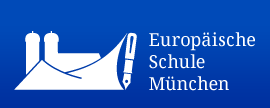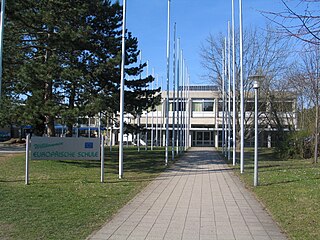Related Research Articles
The European School, Culham (ESC) was one of the fourteen European Schools and the only one in the United Kingdom. Located in Culham near Abingdon in Oxfordshire. It was founded in 1978 for the purpose of providing an education to the children of staff working for the European Atomic Energy Community (Euratom).
A European School is a type of international school emphasising a multilingual and multicultural pedagogical approach to the teaching of nursery, primary and secondary students, leading to the European Baccalaureate as their secondary leaving qualification. Each European School is set up, financed, and operated by the international organisation, the "European Schools", controlled jointly by the member states of the European Union and the European Commission. The schools prioritise, for enrolment purposes, the children of EU staff.
The European Baccalaureate is a bilingual educational diploma, which certifies the completion of secondary studies in a European School or Accredited European School by the Board of Governors of the intergovernmental organisation, "The European Schools". The diploma is awarded for the successful achievement of coursework and concomitant examinations which require that students take a minimum of 10 courses as well as be fully proficient in two languages. Students may take up to 14 courses. It is officially recognised as an entry qualification for Higher Education in all the member states of the European Union (EU), as well as in a number of others. All participating countries are legally obligated to ensure EB diploma holders enjoy the same rights and benefits as other holders of secondary school-leaving certificates in their jurisdictions. The name ‘European Baccalaureate’ belongs solely to the European Schools, which, since their establishment, have had a monopoly over its use in all the official languages of the EU.

The European School, Munich (ESM) is one of thirteen European Schools and one of three in Germany. First established in 1977, it moved to its current location in Neuperlach, a district in the south-east of Munich, in the state of Bavaria in 1981. The ESM was principally established to serve the schooling needs of children of the staff of the European Patent Office (EPO) — the executive body of the European Patent Organisation. However, enrolment is open to other prospective students. The school offers the European Baccalaureate as its secondary leaving qualification.

The European School, Bergen is one of the thirteen European Schools. It is located in the town of Bergen in the Dutch province of North Holland. The school prioritises, for enrolment purposes, the children of European Union staff. Students must enrol in either the English, French or Dutch language sections of the school.
The European School, Brussels II is one of thirteen European Schools in the European Union (EU), and of four in Brussels. It is situated on Avenue Oscar Jespers, in the Brussels suburb of Woluwe-Saint-Lambert.

The European School, Brussels I (ESB1) is a European School located in Uccle, Brussels, Belgium, and Forest, Brussels, Belgium. Originally the second of the European Schools to be founded, the European School, Brussels I, is today one of four in Brussels, and thirteen such schools across the European Union (EU). It is an all-through school, which exists primarily to provide an education to children of EU staff and officials based in Brussels leading to the European Baccalaureate as their secondary leaving qualification. Its alumni include the President of the European Commission, Ursula von der Leyen, and Boris Johnson.
The European School, Luxembourg II (ESL2) is a European School, located on the border of the communes of Bertrange and Mamer in Luxembourg. Founded in 2004, the school prioritises, for enrolment purposes, pupils of EU staff based nearby. It is an all-through school, which offers a multilingual, multicultural education to its pupils, leading to the European Baccalaureate as its secondary leaving qualification.
The Europa School UK is an all-through, free school and IB world school located in Culham near Abingdon in Oxfordshire. It was founded in 2012 by stakeholders of the European School, Culham and subsumed the former school's campus upon its closure in 2017. It now offers the International Baccalaureate Diploma Programme and Middle Years Programme in the secondary section and a bilingual curriculum in primary with English and one of German, French or Spanish. From its foundation until 31 August 2021, it was the only Accredited European School in the United Kingdom. This status was lost due to Brexit.

The European School, Karlsruhe, commonly known as ESK, is one of three European Schools in Germany and one of thirteen across the European Union (EU). Founded in 1962, the school prioritises, for enrolment purposes, the children of staff of the European Commission's Joint Research Centre for Nuclear Safety and Security based nearby. Children of non-EU staff may enrol provided there is capacity. ESK is an all-through school catering for nursery, primary and secondary pupils, culminating in the awarding of the European Baccalaureate as its secondary leaving qualification.

The European School The Hague, or ESH is an Accredited European School offering nursery, primary and secondary education in 13 European languages, leading to the European Baccalaureate.
The European School, Brussels III is one of the thirteen European Schools and one of the four located in Brussels. Founded in 1999, it is located in the Brussels municipality of Ixelles (Elsene). The school combines nursery, primary and secondary education, with 3,097 students enrolled at the start of the 2018–2019 academic year, spread over seven language sections. The school priotises the children of European Union (EU) staff for enrolment purposes, with others able to enrol provided there is capacity. Transport links to the school campus include Delta station and Hankar station which provides metro, bus and suburban rail services.
Tallinn European School, or TES, is a private, Accredited European School in Tallinn, Estonia. Founded in 2013, it is an all-through school which offers a multicultural and multilingual education leading to the European Baccalaureate as its secondary leaving qualification. TES is Estonia's largest international school, and the first of the Accredited European Schools, found across the European Union, to be established in the Baltic states.

The European School of Strasbourg, or EES, is a public Accredited European School in Strasbourg, France. Founded in 2008, it is an all-through school, which offers a multicultural and multilingual education leading to the European Baccalaureate as its secondary leaving qualification.

The European School of Bruxelles-Argenteuil, also known as the EEBA, is a private, Accredited European School located on the grounds of the Château d'Argenteuil, in Waterloo, 15 km south of Brussels, Belgium. Founded in 2016, the EEBA is a partnership between the Belgian private school "Lycée Molière", and the Scandinavian School of Brussels (SSB). The EEBA, through its partnership with the SSB, offers its students the International Baccalaureate as its secondary leaving qualification, with plans to also offer the European Baccalaureate in the near future. The school caters to nursery, primary and secondary students and is equipped with facilities for boarders aged 15 and up.
The European School of Alicante is one of thirteen European Schools and the only one in Spain. Founded in 2002, it primarily serves to provide an education to the children of staff posted to the European Union Intellectual Property Office, an EU agency based in the city of Alicante.

The European School, Brussels IV is one of the thirteen European Schools, and the fourth to be established within the city of Brussels, home to many European Union (EU) institutions. Opened in 2007, the school was initially based in the Brussels municipality of Forest, before moving to its purpose built campus in Laeken in 2012. The school combines nursery, primary and secondary education, with around 3,000 students enrolled at the start of the 2020–2021 academic year, spread over eight language sections (English, French, German, Dutch, Italian, Bulgarian, Romanian and Estonian. The school prioritises the children of European Union staff for enrolment purposes, with others able to enrol provided there is capacity. Transport links to the school campus include Bockstael Station, which provides metro and suburban rail services.

The European School Copenhagen (ESC) is an Accredited European School situated in the heart of the Carlsberg district of Copenhagen, Denmark. It caters to nursery, primary and secondary level students, leading to the European Baccalaureate as its secondary leaving qualification. The ESC is affiliated to the Sankt Annæ Gymnasium, a local Danish school, and is overseen by a joint management board of the two schools.

The European Schools is an intergovernmental organisation, which has established, finances, and administers a small group of multilingual international schools, bearing the title "European School", which exist primarily to offer an education to the children of European Union (EU) staff; offers accreditation to other schools, bearing the title "Accredited European School", under national jurisdiction within EU member states to provide its curriculum; and oversees the provision of the secondary school leaving diploma, the European Baccalaureate.

The European School of Paris-La Défense is a public Accredited European School in the business district of La Défense near Paris, France. Founded in 2019, it is an all-through school, which offers a multicultural and multilingual education leading to the European Baccalaureate as its secondary leaving qualification.
References
- ↑ "About the Accredited European Schools". eursc.eu. Office of the Secretary General of the European Schools. Retrieved 27 March 2019.
- 1 2 "Locations of the Accredited European Schools". eursc.eu. Office of the Secretary General of the European Schools. Retrieved 24 October 2021.
- ↑ Board of Governors of the European Schools (January 2013). "Accredited European Schools" (PDF). Office of the Secretary General of the European Schools. p. 3. Retrieved 30 March 2019.
In various documents different terms were used to define Accredited European Schools: TYPE II and TYPE III European Schools, European Schooling, and Associate Schools. European Schools established pursuant to Article 2 of the Convention are denominated Type I European Schools, while both Type II and Type III European Schools are schools accredited by the Board of Governors as offering European schooling equivalent to that in Type I European Schools. A distinction was made between TYPE II and TYPE III European Schools on the grounds that, unlike the latter, the TYPE II European Schools give priority for enrolment purposes to children of staff of the EU institutions and other bodies as defined by the relevant EU legislation and are therefore entitled to receive funding from the European Commission in proportion to the number of such EU staff pupils enrolled pursuant to the applicable legislation. However, from the point of view of the European School system, which is exclusively responsible for the pedagogical accreditation, there is no difference between the two. For the sake of simplification and harmonisation, in the context of the pedagogical accreditation it is proposed from now on to use the term "Accredited European Schools", which includes both TYPE II and TYPE III Schools.
- ↑ "Accredited European Schools Data | Data valid on 15 October 2021" (PDF). eursc.eu. Office of the Secretary-General of the European Schools. Archived (PDF) from the original on 14 December 2021. Retrieved 14 December 2021.
- ↑ "Explanatory Memorandum to The European Union (European Schools) Regulations 2021" (PDF). legislation.gov.uk. National Archives. p. 2. Retrieved 14 May 2021.
Europa School UK on the former site of the European School Culham will lose its accredited European School status on 31 August 2021.